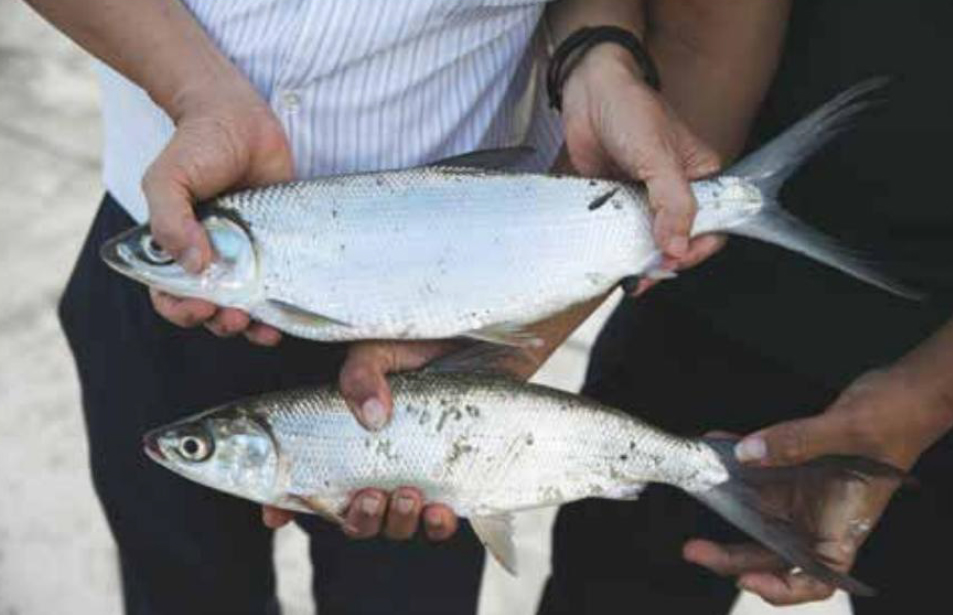News
CommonWealth Magazine's Smile Taiwan Report: Making Microorganisms More Powerful to Increase Production and Value of Agricultural, Livestock and Aquatic Products
2023/02/21

▲Researchers have developed versatile beneficial microbes that improve fish gut microbiota, enhance fish plumpness, and improve pond water quality. The milkfish at the top, fed with probiotics, grew larger than the control group below.
Probiotics, known for aiding human gut health, also promote the growth and disease resistance of crops, livestock, and aquatic animals. In Taiwan, a team of agricultural experts across microbiology, botany, zoology, and aquaculture has formed an interdisciplinary research group to develop diverse applications for four strains of beneficial microbes, aiming for rapid industrialization.
Microorganisms, including viruses, bacteria, fungi, and algae, are ubiquitous. While some have caused disasters, others benefit humanity. Modern scientists harness antimicrobial substances produced by microbes to combat harmful bacteria and decompose pollutants, improving human life.
In agriculture, Taiwanese academia has identified microbes that aid plant, livestock, and aquatic animal growth and address soil pesticide residues, balancing food security with environmental friendliness.However, academic research often focuses on single-strain applications, limiting diversity and commercialization. Professor Huang Zhenwen of National Chung Hsing University's Department of Plant Pathology emphasizes the need for interdisciplinary collaboration to unlock microbial potential.
Accelerating Probiotic Industrialization Through Cross-Disciplinary Collaboration
Professor Huang's team has collected soil and plant samples across Taiwan, isolating strains that promote crop growth, resist pests, and degrade
pesticide residues.
To maximize microbial efficacy and expedite commercialization, the team selected three Bacillus strains (Bacillus subtilis, Bacillus licheniformis, Bacillus coagulans) and one Streptomyces strain. Collaborating with the Agricultural Technology Research Institute's plant, animal, and aquaculture divisions, they launched interdisciplinary research under the Ministry of Science and Technology's "Smart Technology Applications in Agricultural Production" program.
As the research team simultaneously develops these four strains of beneficial bacteria in the fields of microorganisms, plants, animals, and aquatic products, what powerful effects have they demonstrated that make the Ministry of Science and Technology optimistic about their industrial value?
Associate Professor Huang Zhibi notes that the three Bacillus strains are recognized as safe feed additives by the U.S., EU, and Taiwan's Council of Agriculture. They promote growth in strawberries, tomatoes, cucumbers, and tea plants, suppress diseases like bacterial wilt and anthracnose, and degrade residual pesticides such as malathion, dimethomorph, and tricyclazole, making them recyclable organic materials.Additionally, these strains can be added to pig and fish feed, fostering beneficial gut flora, accelerating weight gain, reducing fecal odor, improving meat quality, enhancing fish plumpness, reducing disease incidence, and improving aquaculture water quality. The Streptomyces strain also exhibits similar benefits in plant disease control and fish disease treatment.
While validating the multifaceted applications of these four probiotics, the research team focuses on converting the technology into market-ready products.
National Chung Hsing University houses a microbial fermentation teaching and research facility, developing formulations and fermentation processes for probiotics. These are then transferred to the Agricultural Technology Research Institute's fermentation plant in the Pingtung Agricultural Biotechnology Park to verify industrial-scale production stability.Researcher Huang Wende, responsible for fermentation and formulation technologies, explains that the institute's 1,500-liter fermenters and spray drying systems, along with skilled personnel, establish commercial production scales, facilitating technology adoption by companies.
Positive Feedback from Farmers and Fishers: Industrialization on the Horizon
The project has already achieved initial technology transfers, with DIAMOND QUANTUM Biotechnology Company adopting applications for two probiotic strains.
DIAMOND QUANTUM, a Taiwanese chemical company producing silicon dioxide and calcium carbonate, has recently established an agricultural technology division. Utilizing trace elements like silicon and calcium, they develop new liquid fertilizers, maintaining a long-term partnership with National Chung Hsing University.Chairman Lin Dongwu observes that extreme weather conditions, such as prolonged rain and heat, increase crop disease susceptibility. Farmers using microbial-based plant protection agents enhance crop disease resistance and resilience, significantly improving survival rates.
Farmers have been impressed by the efficacy of these microbes. Huang Shunü, head of Jiahe Agricultural Products in Pingtung's Wandan Township, cultivates organic basil supplied to Taiwan's three major retail channels. She reports that downy mildew severely affected basil in recent years, with even safe pesticides proving ineffective. After using DIAMOND QUANTUM's microbial formulations, she no longer fears downy mildew attacks.
Her organically grown basil now thrives and stores well, fetching a wholesale price of NT$180 per kilogram—three to four times that of conventionally grown basil. Small packages can sell for up to NT$800 per kilogram. She exclaims, "Microbes have added value to basil. Holding a bunch feels like holding a stack of cash—it's exhilarating!"
Young fisherman Huang Huansheng, whose family has farmed milkfish in Kaohsiung's Mituo District since his great-grandfather's time, also participated in the project. Feeding milkfish with probiotic-enhanced feed resulted in superior weight, length, meat thickness, health, feed conversion ratio, and vitality compared to the control group.
"Even the white shrimp co-cultured with the milkfish showed noticeable differences," Huang notes. Pulling up a shrimp net in the test area, he observed the shrimp lively and active upon surfacing. He explains that shrimp consuming probiotic-enhanced feed exhibit strong stress resistance and immunity.
The positive responses from farmers and fishers bolster the research team's and DIAMOND QUANTUM's confidence in further development. Next, the team plans to study probiotic applications in poultry feed, continuing to pave a rapid path for the diverse application and industrialization of Taiwan's microbial formulations.
Article Link:https://smiletaiwan.cw.com.tw/article/6055
Back
